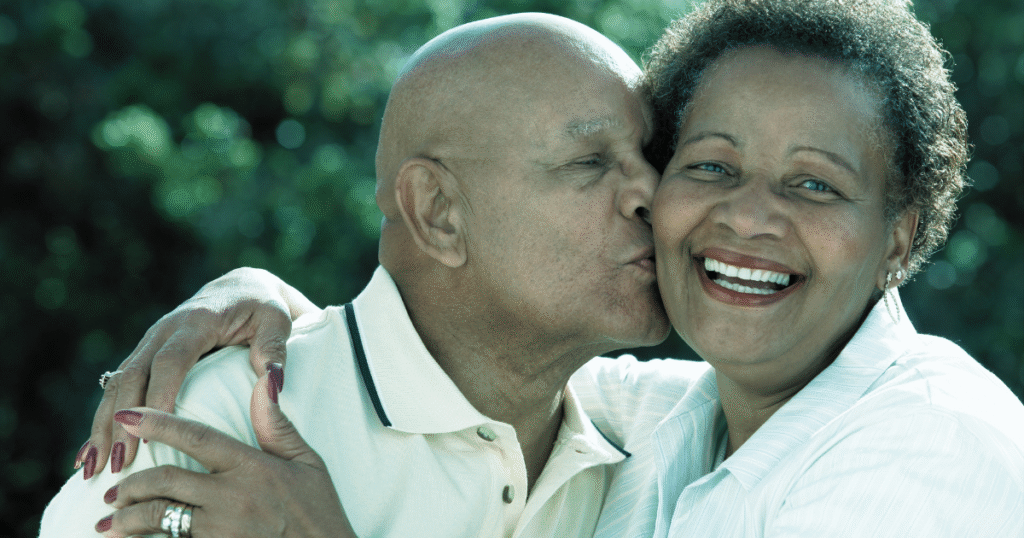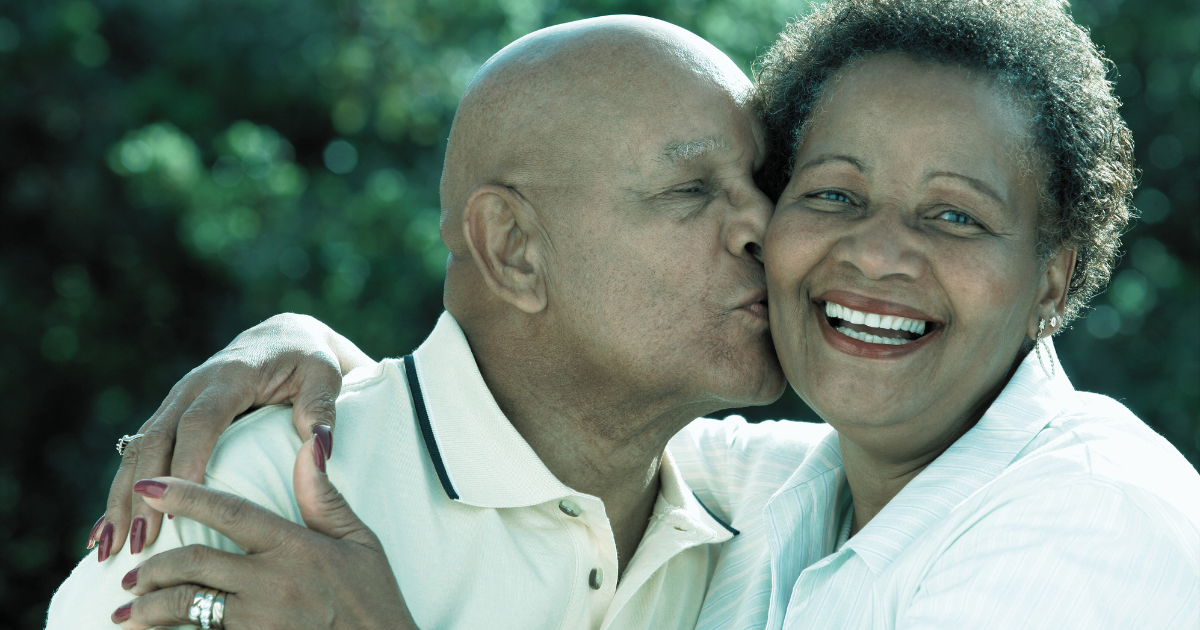Age is never “just a number” –
Aging is a process.
Aging is a journey.
Time changes things, and that’s not always a bad thing.
As we age, our bodies and minds change, and these shifts can influence how we experience sex. While the journey of aging brings many changes, it doesn’t mean the end of a satisfying sex life. In fact, sex after we hit our 50s can be incredibly fulfilling, offering new opportunities for emotional connection, intimacy, and pleasure.
However, when it comes to our bodies and sexual selves, there may be changes that occur with age that are a surprise, unexpected, or you may realize that you wish you knew more about before it happens to you.
Here’s a look at how sex changes after “a certain age” and how you can continue to enjoy a pleasurable sex life.
Please note: Everybody is different. There is no specific numerical age or guarantee that you will experience everything mentioned in this article.
Disclaimer: This article is provided for educational and informational purposes only and does not constitute providing medical advice.

For Vagina Owners
Whether it’s about staying youthful, preventing aging, or menopausal horror stories, our society tends to focus exclusively on the aging process of vagina owners.
Unfortunately, this stigma leads to misinformation and, often, fear. Thankfully, knowledge is power, and your sex life can still continue (it might even get better!)
Menopause
Menopause marks a significant transition in one’s life, as it signifies the end of one’s fertility. Menopause occurs when the ovaries stop producing hormones (specifically, estrogen and progesterone). Typically, this occurs in midlife or if the ovaries are surgically removed prior to menopause. It is the decrease of these hormones that causes various physical, emotional, and hormonal changes.
We have all heard about hot flashes, night sweats, and mood changes – but what about the sexual changes that occur? Many times, menopause also impacts individuals sexually.
Sexual Desire
Hormonal shifts and the overall process of aging can cause fluctuations in sexual desire. Some individuals experience a permanent drop in libido, while others find their sexual appetite increases once they are free from concerns about menstruation or pregnancy.
Physical Vaginal Changes
The decrease in hormones causes physical changes to the vagina. Lower estrogen levels cause the vaginal walls to become thinner and less elastic, and the vagina itself may shorten and narrow. These changes commonly affect one’s natural lubrication and discomfort during sex.
You can use Kegel cherries for strengthening and maintaining your vaginal muscles.
Decreased Natural Lubrication
The hormonal and physical changes that occur affect the natural lubrication of the vagina. While the vagina naturally lubricates itself, this function often decreases with age. Not having enough lubrication will cause sex to feel less pleasurable and potentially painful.
If you are experiencing vaginal dryness or pain during sex, using lubricants before and during vaginal play can make sex more comfortable.
Try incorporating Oh!Nectar Massage Oil to also enjoy the benefits of CBD along with your pleasure 😉

For Penis Owners
You read that right – penis owners experience sexual changes with age too!
Technically, several changes occur in penis owners as they age.
Does that mean… Penis owners go through menopause?
Technically, no. However, similarly to their vagina-owning counterparts, penis owners are also affected by their hormones as they age. Specifically, testosterone levels will decrease as one ages. The decrease of testosterone impacts penis owners in various ways: physiologically, physically, mentally, emotionally, and sexually.
Some of the sexual changes include:
Overall Changes
- A slower sexual response time
- Reduced sexual desire
- Difficulty with arousal
- Decreased ability to orgasm
- Premature ejaculation
- Decreased intensity of orgasm
- A longer period of time required between orgasms (ejaculations)
- A longer period of time required between erections
Erection Changes
Increasing age and decreasing testosterone increase the probability of penis owners being unable to achieve or maintain an erection. Concurrently, erections may not last as long as they once did previously.
- Decrease in the firmness and size of erections
- Increased sexual stimulation may become necessary
- Increased difficulty achieving an erection
- Increased difficulty maintaining an erection
- The loss of an erection after orgasm happens more quickly

For Everybody:
The almighty aging process, along with hormonal changes, affects everybody after “a certain age”.
Changes in Libido and Satisfaction
As individuals age, all will experience changes in their sexual experiences.
Through the many phases of life, sexual desire fluctuates for all individuals. Over time, sexual desire will increase and decrease due to various factors, such as stress, child-rearing, and relationship satisfaction. Similarly, the ability to orgasm may be more difficult to achieve at times.
Many older individuals find greater satisfaction in their sex lives than they did when they were younger. They may have fewer distractions, more time and privacy, and no worries about getting pregnant. They also may be better able to express what they want and need, which can offer an opportunity for greater intimacy and connection.
If sexual desire and arousal are becoming more difficult to achieve, it’s not a lost cause! Spend more time on foreplay, which can help arousal build naturally. Explore different types of touch, massages, or oral sex to enhance stimulation. Experimenting with vibrators or other sexual aids can also increase pleasure and excitement.
STIs
Being of “a certain age” does not protect you from sexually transmitted infections (STIs).
ANYBODY who is sexually active is still at risk for sexually transmitted infections, including chlamydia, gonorrhea, syphilis, genital herpes, genital warts, trichomoniasis, and HIV.
Learn more about STIs here.
Keep Your Pelvic Floor Strong
Pelvic floor dysfunction can occur at any age.
A weak pelvic floor may cause incontinence issues, pain during sex, and/or interfere with daily activities. The pelvic floor also directly impacts one’s sexual abilities, such as orgasm intensity, ability to control orgasm, and overall sexual satisfaction.
Research shows that a weak pelvic floor negatively affects one’s sexual ability and satisfaction.
Pelvic floor exercises, like Kegels, can strengthen pelvic muscles, improve bladder control, and enhance sexual abilities. Regular pelvic floor exercise helps train and maintain muscle tone, which benefits sexual function.
Most people aren’t aware that penis owners have a pelvic floor too! A weak pelvic floor for a penis owner can cause erectile and orgasm difficulties.
Pelvic floor therapy is available to help improve pelvic floor health.
Embracing a New Chapter of Sexuality
While aging may alter your sexual experiences, it doesn’t mean the end of a fulfilling sex life.
Sex in our golden years becomes affected by hormones, physical changes, and the ups and downs of sexual desire. Despite these changes, it’s important to remember that sex doesn’t have to diminish; it just might require some adjustments. While it might look different from sex in your younger years, it can be just as, if not more, rewarding.
Aging doesn’t mean the end of sexual pleasure and satisfaction; it simply means the beginning of a new chapter in your sexual journey. Embrace it, celebrate it, and continue to nurture this journey.
Resources
https://www.cdc.gov/sti/about/index.html
https://www.nia.nih.gov/health/sexuality/sexuality-and-intimacy-older-adults
https://www.smsna.org/patients/blog/how-sex-changes-with-age
https://www.ncoa.org/article/sex-after-50-how-our-changing-body-affects-our-sexual-health

